- Home
- J. R. R. Tolkien
The Children of Húrin Page 2
The Children of Húrin Read online
Page 2
But not all the Eldar, though they had crossed the Blue Mountains, departed over the Sea; and those who remained in Beleriand are named the Sindar, the Grey Elves. Their high king was Thingol (which means ‘Grey-cloak’), who ruled from Menegroth, the Thousand Caves in Doriath. And not all the Eldar who crossed the Great Sea remained in the land of the Valar; for one of their great kindreds, the Noldor (the ‘Loremasters’), returned to Middle-earth, and they are called the Exiles. The prime mover in their rebellion against the Valar was Fëanor, ‘Spirit of Fire’: he was the eldest son of Finwë, who had led the host of the Noldor from Cuiviénen, but was now dead. This cardinal event in the history of the Elves was thus briefly conveyed by my father in Appendix A to The Lord of the Rings:
Fëanor was the greatest of the Eldar in arts and lore, but also the proudest and most selfwilled. He wrought the Three Jewels, the Silmarilli, and filled them with the radiance of the Two Trees, Telperion and Laurelin, that gave light to the land of the Valar. The Jewels were coveted by Morgoth the Enemy, who stole them and, after destroying the Trees, took them to Middle-earth, and guarded them in his great fortress of Thangorodrim [the mountains above Angband]. Against the will of the Valar Fëanor forsook the Blessed Realm and went in exile to Middle-earth, leading with him a great part of his people; for in his pride he purposed to recover the Jewels from Morgoth by force. Thereafter followed the hopeless war of the Eldar and the Edain against Thangorodrim, in which they were at last utterly defeated.
Fëanor was slain in battle soon after the return of the Noldor to Middle-earth, and his seven sons held wide lands in the east of Beleriand, between Dorthonion (Taur-nu-Fuin) and the Blue Mountains; but their power was destroyed in the terrible Battle of Unnumbered Tears which is described in The Children of Húrin, and thereafter ‘the Sons of Fëanor wandered as leaves before the wind’ (†).
The second son of Finwë was Fingolfin (the half-brother of Fëanor), who was held the overlord of all the Noldor; and he with his son Fingon ruled Hithlum, which lay to the north and west of the great chain of Ered Wethrin, the Mountains of Shadow. Fingolfin dwelt in Mithrim, by the great lake of that name, while Fingon held Dor-lómin in the south of Hithlum. Their chief fortress was Barad Eithel (the Tower of the Well) at Eithel Sirion (Sirion’s Well), where the river Sirion rose in the east face of the Mountains of Shadow: Sador, the old crippled servant of Húrin and Morwen, served as a soldier there for many years, as he told Túrin (†). After Fingolfin’s death in single combat with Morgoth Fingon became the High King of the Noldor in his stead. Túrin saw him once, when he ‘and many of his lords had ridden through Dor-lómin and passed over the bridge of Nen Lalaith, glittering in silver and white’ (†).
The second son of Fingolfin was Turgon. He dwelt at first, after the return of the Noldor, in the house named Vinyamar, beside the sea in the region of Nevrast, west of Dor-lómin; but he built in secret the hidden city of Gondolin, which stood on a hill in the midst of the plain called Tumladen, wholly surrounded by the Encircling Mountains, east of the river Sirion. When Gondolin was built, after many years of labour, Turgon removed from Vinyamar and dwelt with his people, both Noldor and Sindar, in Gondolin; and for centuries this Elvish redoubt of great beauty was preserved in the most profound secrecy, its only entry undiscoverable and heavily guarded, so that no stranger could ever pass in; and Morgoth was unable to learn where it lay. Not until the Battle of Unnumbered Tears, when more than three hundred and fifty years had passed since he left Vinyamar, did Turgon emerge with his great army from Gondolin.
The third son of Finwë, the brother of Fingolfin and half-brother of Fëanor, was Finarfin. He did not return to Middle-earth, but his sons and daughter came with the host of Fingolfin and his sons. The eldest son of Finarfin was Finrod, who, inspired by the magnificence and beauty of Menegroth in Doriath, founded the underground fortress-city of Nargothrond, for which he was named Felagund, interpreted to mean ‘Lord of Caves’ or ‘Cave-hewer’ in the tongue of the Dwarves. The doors of Nargothrond opened onto the gorge of the river Narog in West Beleriand, where that river passed through the high hills called Taur-en-Faroth, or the High Faroth; but Finrod’s realm extended far and wide, east to the river Sirion, and west to the river Nenning that reached the sea at the haven of Eglarest. But Finrod was slain in the dungeons of Sauron, chief servant of Morgoth, and Orodreth, the second son of Finarfin, took the crown of Nargothrond: this took place in the year following the birth of Túrin in Dor-lómin.
The other sons of Finarfin, Angrod and Aegnor, vassals of their brother Finrod, dwelt on Dorthonion, looking northwards over the vast plain of Ard-galen. Galadriel, Finrod’s sister, dwelt long in Doriath with Melian the Queen. Melian was a Maia, a spirit of great power who took human form and dwelt in the forests of Beleriand with King Thingol: she was the mother of Lúthien, and the foremother of Elrond. Not long before the return of the Noldor from Aman, when great armies out of Angband came south into Beleriand, Melian (in the words of The Silmarillion) ‘put forth her power and fenced all that dominion [the forests of Neldoreth and Region] round about with an unseen wall of shadow and bewilderment: the Girdle of Melian, that none thereafter could pass against her will or the will of King Thingol, unless one should come with a power greater than that of Melian the Maia.’ Thereafter the land was named Doriath, ‘the Land of the Fence’.
In the sixtieth year after the return of the Noldor, ending many years of peace, a great host of Orcs came down from Angband, but was utterly defeated and destroyed by the Noldor. This was called Dagor Aglareb, the Glorious Battle; but the Elvish lords took warning from it, and set the Siege of Angband, which lasted for almost four hundred years.
It was said that Men (whom the Elves called Atani ‘the Second’, and Hildor ‘the Followers’) arose far off in the east of Middle-earth towards the end of the Elder Days; but of their earliest history the Men who entered Beleriand in the days of the Long Peace, when Angband was besieged and its gates shut, would never speak. The leader of these first Men to cross the Blue Mountains was named Bëor the Old; and to Finrod Felagund, King of Nargothrond, who first encountered them Bëor declared: ‘A darkness lies behind us; and we have turned our backs on it, and we do not desire to return thither even in thought. Westwards our hearts have been turned, and we believe that there we shall find Light.’ Sador, the old servant of Húrin, spoke in the same way to Túrin in his boyhood (†). But it was said afterwards that when Morgoth learned of the arising of Men he left Angband for the last time and went into the East; and that the first Men to enter Beleriand ‘had repented and rebelled against the Dark Power, and were cruelly hunted and oppressed by those that worshipped it, and its servants’.
These Men belonged to three Houses, known as the House of Bëor, the House of Hador, and the House of Haleth. Húrin’s father Galdor the Tall was of the House of Hador, being indeed his son; but his mother was of the House of Haleth, while Morwen his wife was of the House of Bëor, and related to Beren.
The people of the Three Houses were the Edain (the Sindarin form of Atani), and they were called Elf-friends. Hador dwelt in Hithlum and was given the lordship of Dor-lómin by King Fingolfin; the people of Bëor settled in Dorthonion; and the people of Haleth at this time dwelt in the Forest of Brethil. After the ending of the Siege of Angband Men of a very different sort came over the mountains; they were commonly referred to as Easterlings, and some of them played an important part in the story of Túrin.
The Siege of Angband ended with a terrible suddenness (though long prepared) on a night of midwinter, 395 years after it had begun. Morgoth released rivers of fire that ran down from Thangorodrim, and the great grassy plain of Ardgalen that lay to the north of the highland of Dorthonion was transformed into a parched and arid waste, known thereafter by a changed name, Anfauglith, the Gasping Dust.
This catastrophic assault was called Dagor Bragollach, the Battle of Sudden Flame. Glaurung Father of Dragons emerged from Angband now for the first time in his full might; vast armi
es of Orcs poured southwards; the Elvish lords of Dorthonion were slain, and a great part of the warriors of Bëor’s people. King Fingolfin and his son Fingon were driven back with the warriors of Hithlum to the fortress of Eithel Sirion in the east face of the Mountains of Shadow, and in its defence Hador Goldenhead was killed. Then Galdor, Húrin’s father, became the lord of Dor-lómin; for the torrents of fire were stopped by the barrier of the Mountains of Shadow, and Hithlum and Dor-lómin remained unconquered.
It was in the year after the Bragollach that Fingolfin, in a fury of despair, rode to Angband and challenged Morgoth. Two years later Húrin and Huor went to Gondolin. After four more years, in a renewed assault on Hithlum, Húrin’s father Galdor was slain in the fortress of Eithel Sirion: Sador was there, as he told Túrin (†), and saw Húrin (then a young man of twenty-one) ‘take up his lordship and his command’.
All these things were fresh in memory in Dor-lómin when Túrin was born, nine years after the Battle of Sudden Flame.
NOTE ON PRONUNCIATION
The following note is intended to clarify a few main features in the pronunciation of names.
Consonants
C — always has the value of k, never of s; thus Celebros is ‘Kelebros’, not ‘Selebros’.
CH — always has the value of ch in Scots loch or German buch, never that of ch in English church; examples are Anach, Narn i Chîn Húrin.
DH — is always used to represent the sound of a voiced (‘soft’) th in English, that is the th in then, not the th in thin. Examples are Glóredhel, Eledhwen, Maedhros.
G — always has the sound of English g in get; thus Region is not pronounced like English region, and the first syllable of Ginglith is as in English begin, not as in gin.
Vowels
AI — has the sound of English eye; thus the second syllable of Edain is like English dine, not Dane.
AU — has the value of English ow in town; thus the first vowel of Sauron is like English sour, not sore.
EI — as in Teiglin has the sound of English grey.
IE — should not be pronounced as in English piece, but with both the vowels i and e sounded, and run together; thus Ni-enor, not ‘Neenor’.
AE — as in Aegnor, Nirnaeth, is a combination of the individual vowels, a-e, but may be pronounced in the same way as AI.
EA — and EO are not run together, but constitute two syllables; these combinations are written ëa and ëo, as in Bëor, or at the beginning of names Eä, Eö, as in Eärendil.
Ú — in names like Húrin, Túrin, should be pronounced oo; thus ‘Toorin’, not ‘Tyoorin’.
IR, UR — before a consonant (as in Círdan, Gurthang) should not be pronounced as in English fir, fur, but as in English, eer, oor.
E — at the end of words is always pronounced as a distinct vowel, and in this position is written ë. It is always pronounced in the middle of words like Celebros, Menegroth.
CHAPTER I
THE CHILDHOOD OF TÚRIN
Hador Goldenhead was a lord of the Edain and well-beloved by the Eldar. He dwelt while his days lasted under the lordship of Fingolfin, who gave to him wide lands in that region of Hithlum which was called Dor-lómin. His daughter Glóredhel wedded Haldir son of Halmir, lord of the Men of Brethil; and at the same feast his son Galdor the Tall wedded Hareth, the daughter of Halmir.
Galdor and Hareth had two sons, Húrin and Huor. Húrin was by three years the elder, but he was shorter in stature than other men of his kin; in this he took after his mother’s people, but in all else he was like Hador, his grandfather, strong in body and fiery of mood. But the fire in him burned steadily, and he had great endurance of will. Of all Men of the North he knew most of the counsels of the Noldor. Huor his brother was tall, the tallest of all the Edain save his own son Tuor only, and a swift runner; but if the race were long and hard Húrin would be the first home, for he ran as strongly at the end of the course as at the beginning. There was great love between the brothers, and they were seldom apart in their youth.
Húrin wedded Morwen, the daughter of Baragund son of Bregolas of the House of Bëor; and she was thus of close kin to Beren One-hand. Morwen was dark-haired and tall, and for the light of her glance and the beauty of her face men called her Eledhwen, the elven-fair; but she was somewhat stern of mood and proud. The sorrows of the House of Bëor saddened her heart; for she came as an exile to Dor-lómin from Dorthonion after the ruin of the Bragollach.
Túrin was the name of the eldest child of Húrin and Morwen, and he was born in that year in which Beren came to Doriath and found Lúthien Tinúviel, Thingol’s daughter. Morwen bore a daughter also to Húrin, and she was named Urwen; but she was called Lalaith, which is Laughter, by all that knew her in her short life.
Huor wedded Rían, the cousin of Morwen; she was the daughter of Belegund son of Bregolas. By hard fate was she born into such days, for she was gentle of heart and loved neither hunting nor war. Her love was given to trees and to the flowers of the wild, and she was a singer and a maker of songs. Two months only had she been wedded to Huor when he went with his brother to the Nirnaeth Arnoediad, and she never saw him again.
But now the tale returns to Húrin and Huor in the days of their youth. It is said that for a while the sons of Galdor dwelt in Brethil as foster-sons of Haldir their uncle, after the custom of Northern men in those days. They often went to battle with the Men of Brethil against the Orcs, who now harried the northern borders of their land; for Húrin, though only seventeen years of age, was strong, and Huor the younger was already as tall as most full-grown men of that people.
On a time Húrin and Huor went with a company of scouts, but they were ambushed by the Orcs and scattered, and the brothers were pursued to the ford of Brithiach. There they would have been taken or slain but for the power of Ulmo that was still strong in the waters of Sirion; and it is said that a mist arose from the river and hid them from their enemies, and they escaped over the Brithiach into Dimbar. There they wandered in great hardship among the hills beneath the sheer walls of the Crissaegrim, until they were bewildered in the deceits of that land and knew not the way to go on or to return. There Thorondor espied them, and he sent two of his Eagles to their aid; and the Eagles bore them up and brought them beyond the Encircling Mountains to the secret vale of Tumladen and the hidden city of Gondolin, which no Man had yet seen.
There Turgon the King received them well, when he learned of their kin; for Hador was an Elf-friend, and Ulmo, moreover, had counselled Turgon to deal kindly with the sons of that House, from whom help should come to him at need. Húrin and Huor dwelt as guests in the King’s house for well nigh a year; and it is said that in this time Húrin, whose mind was swift and eager, gained much lore of the Elves, and learned also something of the counsels and purposes of the King. For Turgon took great liking for the sons of Galdor, and spoke much with them; and he wished indeed to keep them in Gondolin out of love, and not only for his law that no stranger, be he Elf or Man, who found the way to the secret kingdom or looked upon the city should ever depart again, until the King should open the leaguer, and the hidden people should come forth.
But Húrin and Huor desired to return to their own people and share in the wars and griefs that now beset them. And Húrin said to Turgon: ‘Lord, we are but mortal Men, and unlike the Eldar. They may endure for long years awaiting battle with their enemies in some far distant day; but for us the time is short, and our hope and strength soon wither. Moreover we did not find the road to Gondolin, and indeed we do not know surely where this city stands; for we were brought in fear and wonder by the high ways of the air, and in mercy our eyes were veiled.’ Then Turgon granted his prayer, and he said: ‘By the way that you came you have leave to return, if Thorondor is willing. I grieve at this parting; yet in a little while, as the Eldar account it, we may meet again.’
But Maeglin, the King’s sister-son, who was mighty in Gondolin, grieved not at all at their going, though he begrudged them the favour of the King, for he had no love
for any of the kindred of Men; and he said to Húrin: ‘The King’s grace is greater than you know, and some might wonder wherefore the strict law is abated for two knave-children of Men. It would be safer if they had no choice but to abide here as our servants to their life’s end.’
‘The King’s grace is great indeed,’ answered Húrin, ‘but if our word is not enough, then we will swear oaths to you.’ And the brothers swore never to reveal the counsels of Turgon, and to keep secret all that they had seen in his realm. Then they took their leave, and the Eagles coming bore them away by night, and set them down in Dor-lómin before the dawn. Their kinsfolk rejoiced to see them, for messengers from Brethil had reported that they were lost; but they would not tell even to their father where they had been, save that they were rescued in the wilderness by the Eagles that brought them home. But Galdor said: ‘Did you then dwell a year in the wild? Or did the Eagles house you in their eyries? But you found food and fine raiment, and return as young princes, not as waifs of the wood.’ ‘Be content, father,’ said Húrin, ‘that we have returned; for only under an oath of silence was this permitted. That oath is still on us.’ Then Galdor questioned them no more, but he and many others guessed at the truth. For both the oath of silence and the Eagles pointed to Turgon, men thought.
So the days passed, and the shadow of the fear of Morgoth lengthened. But in the four hundred and sixty-ninth year after the return of the Noldor to Middle-earth there was a stirring of hope among Elves and Men; for the rumour ran among them of the deeds of Beren and Lúthien, and the putting to shame of Morgoth even upon his throne in Angband, and some said that Beren and Lúthien yet lived, or had returned from the Dead. In that year also the great counsels of Maedhros were almost complete, and with the reviving strength of the Eldar and the Edain the advance of Morgoth was stayed, and the Orcs were driven back from Beleriand. Then some began to speak of victories to come, and of redressing the Battle of the Bragollach, when Maedhros should lead forth the united hosts, and drive Morgoth underground, and seal the Doors of Angband.

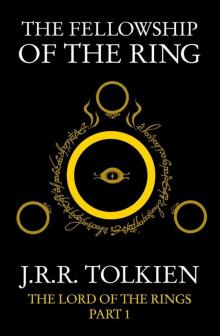 The Fellowship of the Ring
The Fellowship of the Ring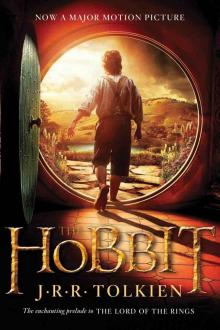 The Hobbit
The Hobbit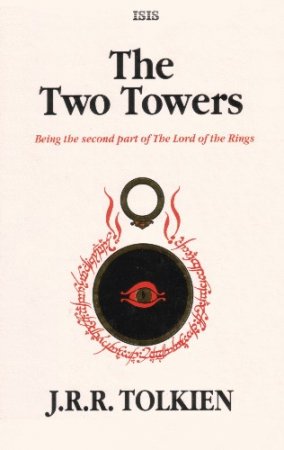 The Two Towers
The Two Towers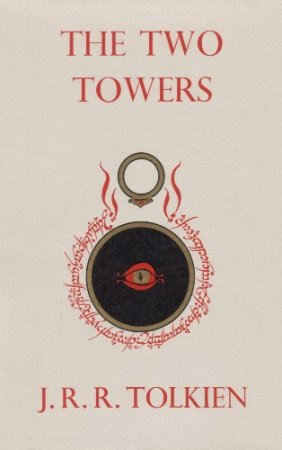 The Return of the King
The Return of the King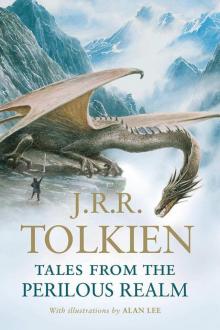 Tales From the Perilous Realm
Tales From the Perilous Realm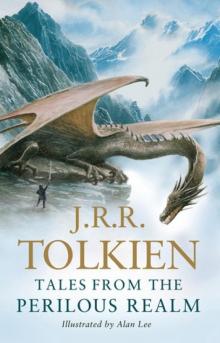 Leaf by Niggle
Leaf by Niggle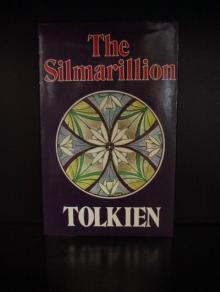 The Silmarillon
The Silmarillon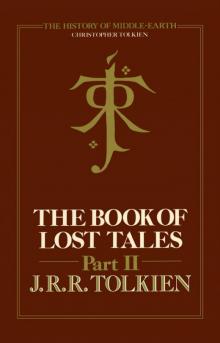 The Book of Lost Tales, Part Two
The Book of Lost Tales, Part Two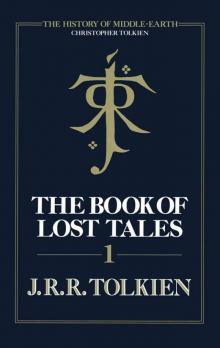 The Book of Lost Tales, Part One
The Book of Lost Tales, Part One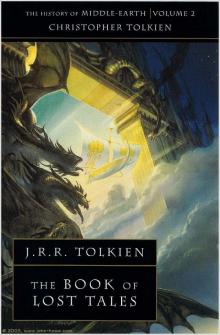 The Book of Lost Tales 2
The Book of Lost Tales 2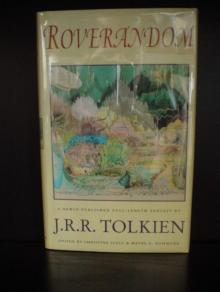 Roverandom
Roverandom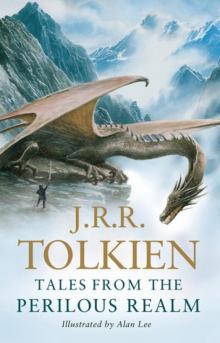 Smith of Wootton Major
Smith of Wootton Major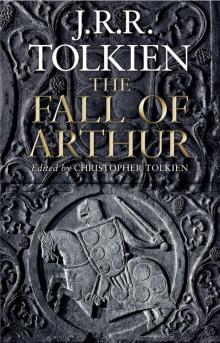 The Fall of Arthur
The Fall of Arthur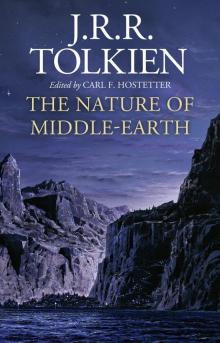 The Nature of Middle-earth
The Nature of Middle-earth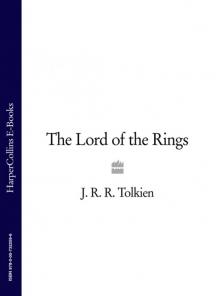 The Lord of the Rings: The Fellowship of the Ring, The Two Towers, The Return of the King
The Lord of the Rings: The Fellowship of the Ring, The Two Towers, The Return of the King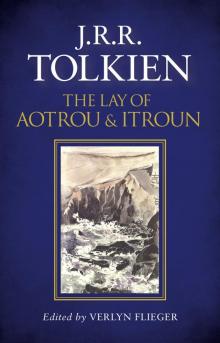 The Lay of Aotrou and Itroun
The Lay of Aotrou and Itroun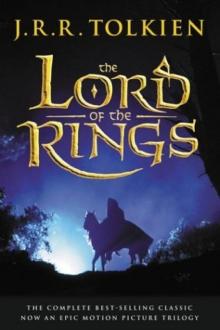 lord_rings.qxd
lord_rings.qxd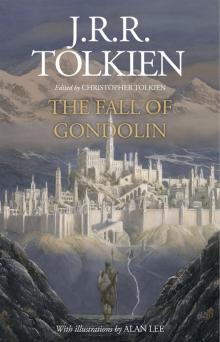 The Fall of Gondolin
The Fall of Gondolin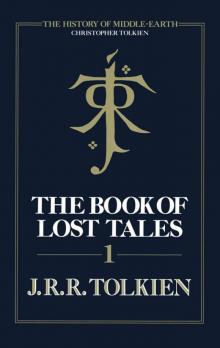 The Book of Lost Tales, Part 1
The Book of Lost Tales, Part 1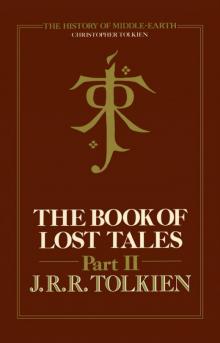 The Book of Lost Tales, Part 2
The Book of Lost Tales, Part 2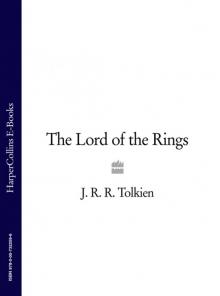 The Lord of the Rings
The Lord of the Rings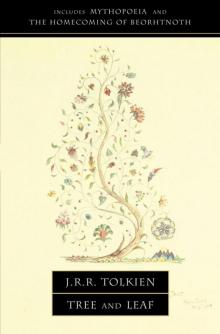 Tree and Leaf
Tree and Leaf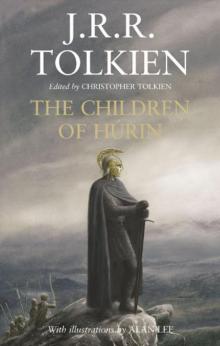 The Children of Húrin
The Children of Húrin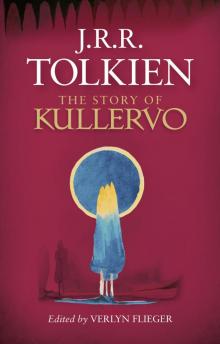 The Story of Kullervo
The Story of Kullervo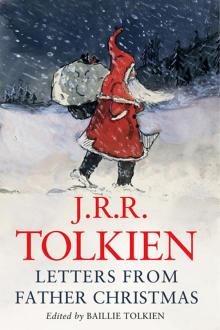 Letters From Father Christmas
Letters From Father Christmas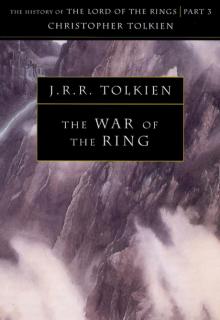 The History of Middle Earth: Volume 8 - The War of the Ring
The History of Middle Earth: Volume 8 - The War of the Ring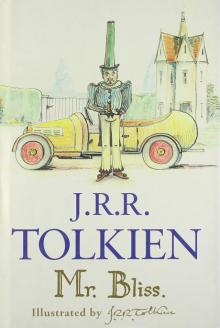 Mr. Bliss
Mr. Bliss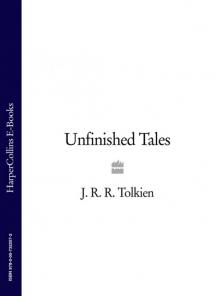 Unfinished Tales
Unfinished Tales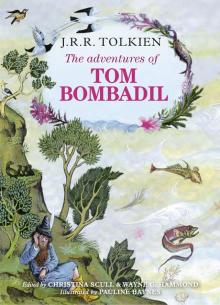 The Adventures of Tom Bombadil
The Adventures of Tom Bombadil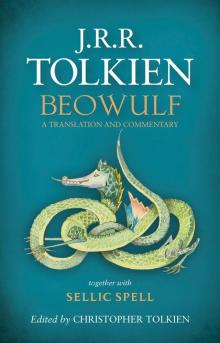 Beowulf: A Translation and Commentary, together with Sellic Spell
Beowulf: A Translation and Commentary, together with Sellic Spell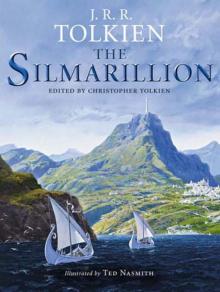 The Silmarillion
The Silmarillion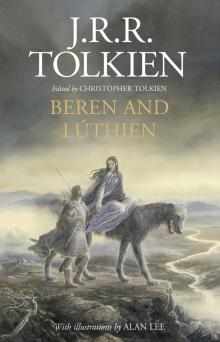 Beren and Lúthien
Beren and Lúthien